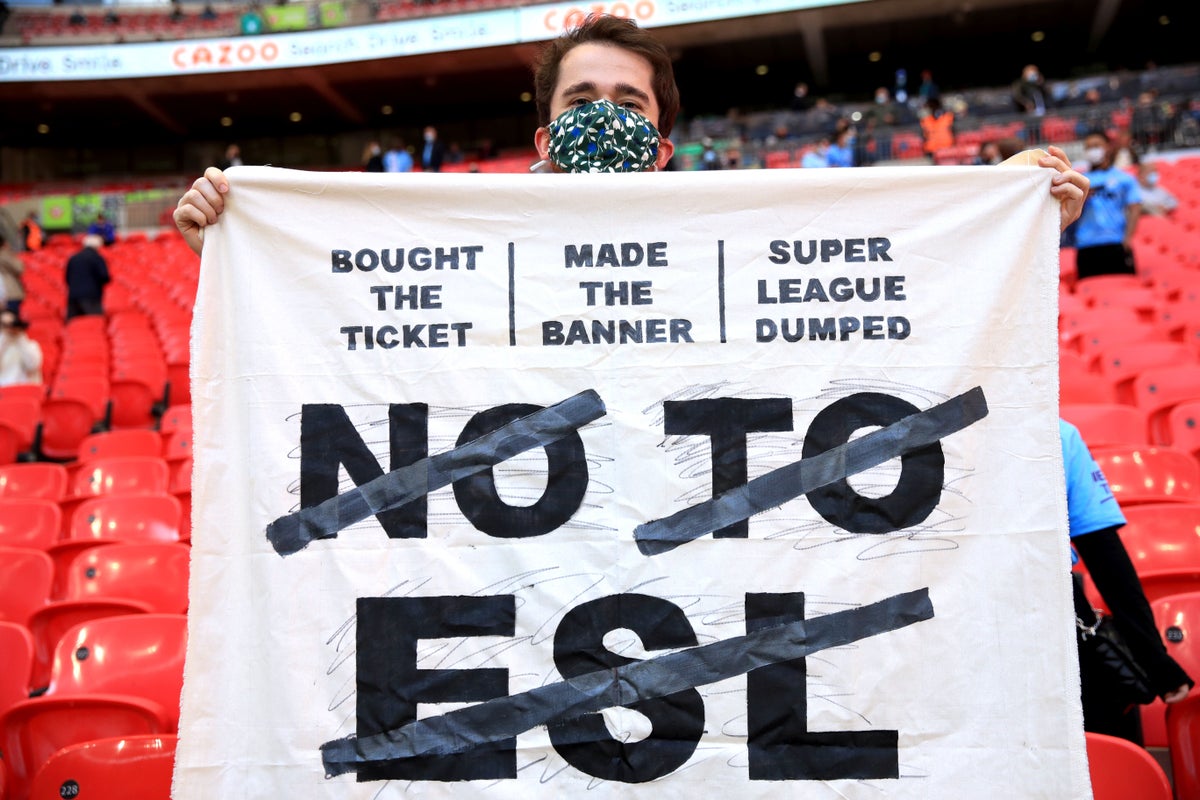
It’s “judgement day” in the European Super League case, as a decision that could shape the future of football is set to be delivered today.
First launched in 2021, the European Super League proposed a breakaway competition involving some of Europe’s biggest teams in a “closed shop” format.
But the controversial plans were met with fierce opposition from fans and the football’s governing bodies, leading to its stunning collapse within days of being launched.
But like a monster from a horror movie, the European Super League wasn’t actually killed off, and now those backing the competition have taken Uefa and Fifa to court as they seek to relaunch their competition.
Now, the Grand Chamber of the European Court of Justice is set to deliver a verdict on the case, in what is a huge moment for the sport. Here’s everything you need to know.
What is being decided today?
The Grand Chamber of the European Court of Justice will decide whether Uefa and Fifa acted against competition law by blocking the formation of the European Super League in 2021 and sanctioning the clubs involved.
A22, the company backing the European Super League, believe Uefa and Fifa are abusing a dominant position by acting as governing body, regulator, commercial operator and gatekeeper, while also having significant sanctioning powers.
They argue Uefa and Fifa should not be able to run a “monopoly” over football and want to have the right to launch new competitions without facing punishment under a free market.
A non-binding decision delivered by the Advocate General in the case last December found rules allowing Uefa to have prior approval of new competitions were compatible with EU law – now the European Court of Justice will now consider its own interpretation of the EU’s competition law and will deliver its verdict on whether Uefa acted lawfully.
“Tomorrow is Uefa Judgment Day,” an A22 post published on X on the day before the verdict read. “After almost 70 years, Uefa’s monopoly may finally end! We are on the threshold of a new, better era for #EuropeanClubFootball.”
What happened to the European Super League in 2021?
It was a rare triumph of fan power when the European Super League first tried to launch back in April 2021 as immediate, sustained protests from across the football community caused the clubs involved to scuttle away with their tail between their legs.
The competition was initially launched with 12 founding members – Arsenal, Chelsea, Liverpool, Manchester City, Manchester United, Tottenham, AC Milan, Inter Milan, Juventus, Atletico Madrid, Barcelona and Real Madrid – who would permanently take part in the competition.
The plan quickly collapsed after the six Premier League clubs pulled out within 24 hours in the face of fierce criticism from supporters, pundits, clubs and the media, but Juventus, Barcelona and Real Madrid remained committed to the concept.
Why is it back now?
After its defeat in 2021, the European Super League returned with a new format, crucially removing the “closed shop” format that would have seen its founding members be immune from relegation.
The latest proposal has been tweaked and could contain up to 80 teams in a multi-divisional format. The Super League would also be based on sporting performance only with no permanent members.
A22 have consulted with nearly 50 European clubs since October last year and developed 10 principles based on that consultation which underpin its plans for a new-look league. The people involved with the European Super League believe football across the continent is in danger and they are the self-appointed guardians to save it.
A22 chief executive Bernd Reichart said the new-look Super League would be an open competition, with qualification achieved via performance at national level and with all its teams competing in their domestic leagues. Those national leagues would remain “the foundation” of the game, Reichart said, and argued that the new Super League would generate new revenues to support the entire pyramid. There is a guarantee of a minimum of 14 matches that would provide “stability and predictability” of revenue.
What about the Premier League?
While Barcelona and Real Madrid seemingly remain committed to the breakaway, there is less known about whether the six Premier League clubs originally involved in the European Super League launch would still consider supporting it.
Additionally, the Premier League has just announced a new domestic television rights deal worth £6.7bn – and there would likely have been strict rules within that agreement that would forbid English clubs from signing up for competitions that are now approved by Uefa or Fifa.
The English game’s new independent regulator has also set out rules forbidding clubs from joining unlicensed competitions, while the Premier League’s Owners’ Charter, agreed in 2022, also states clubs must not “engage in the creation of new competition formats outside of the Premier League’s rules”.
What are the ‘10 principles’ of the new European Super League?
There remains a lack of specific detail available over the Super League’s newly scrubbed reform plan, but they have released a list of 10 principles to govern their approach. They say they have been formed after “consistent feedback” with clubs, though they opted against saying which ones.
The 10 guiding principles are listed as:
- Meritocratic competitions, with multi-divisional format and no permanent members
- Clubs remain committed to domestic tournaments
- Improve competitiveness with stable, sustainable resources
- Player health at the centre of the game
- Well-enforced and transparent financial sustainability rules
- Create “the world’s best football competition”
- Improved fan experience
- Develop and finance women’s football by putting it “centre stage” side-by-side with men’s game
- Significant increase in solidarity
- Respect for EU laws and values







